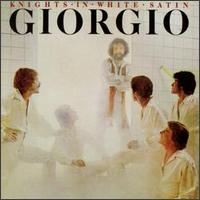This article needs additional citations for verification .(January 2021) |
| Knights in White Satin | ||||
|---|---|---|---|---|
 | ||||
| Studio album by | ||||
| Released | April 1976 | |||
| Recorded | 1976 | |||
| Studio | Musicland Studios, Munich | |||
| Genre | ||||
| Length | 31:04 | |||
| Label | Oasis | |||
| Producer | Giorgio Moroder | |||
| Giorgio Moroder chronology | ||||
| ||||
| Singles from Knights in White Satin | ||||
| ||||
Knights in White Satin is a 1976 album composed, produced and performed by Giorgio Moroder.
Contents
Side A of the album is a continuous three part suite, consisting of a disco version of the Moody Blues' 1967 hit "Nights in White Satin", with a Moroder/Bellotte composition called "In the Middle of the Knight" acting as the second (middle) section. The composition is typical of the disco era in that it covers an entire LP side, but atypical as it is quite slow, only 110bpm, and not what was usually considered the standard at the time, which was 120bpm.
The primary bass line figure used in the "Knights in White Satin" track was re-used, at a faster tempo and with additional delay effects, in "Chase", recorded for Moroder's 1978 soundtrack of Alan Parker's film, Midnight Express .